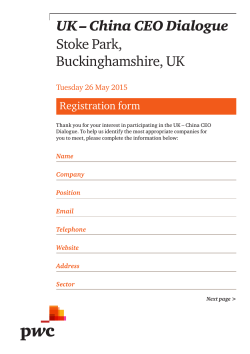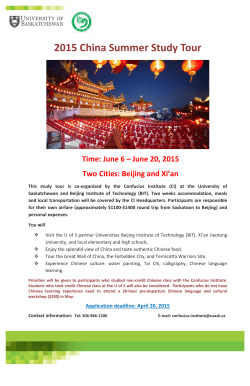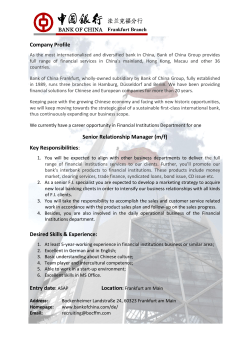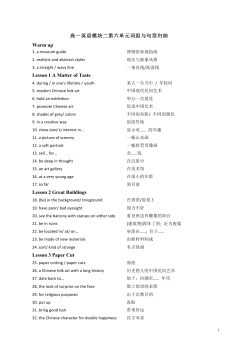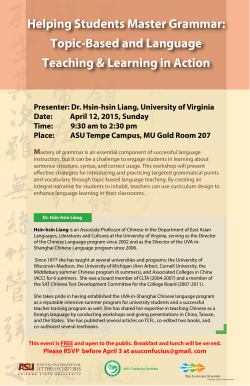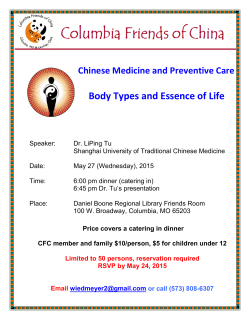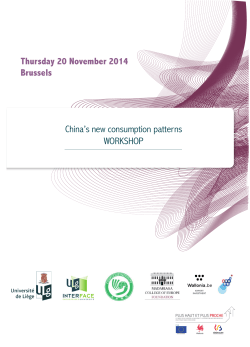
Chinese, a Low Variety of Language in China
International Journal of Business and Social Science Vol. 6, No. 5; May 2015 Chinese, a Low Variety of Language in China DENG Yunfei School of Foreign Languages West China Normal University Nan Chong, China Abstract Diglossia, a sociolinguistic term, refers to the phenomenon in which two varieties of language co-exist in a relatively stable language situation, with one a “high” variety (H) and the other a “low” variety (L). English mania in China has bred concerns about Chinese being neglected and even replaced by English in prominence. Measures have been taken to reduce the weight of score allocation of English and increase that of Chinese in the Senior High School Entrance Exam and the College Entrance Examination. This paper discusses issues of English’s status in China since 1949, the contributions English made to Chinese and the co-existence of English and Chinese, expounding that as one of the members of WTO, and the initiator of the notion of “OBOR”, China should be open-minded, discarding the misgivings about English. English, as an international language, plays an important role in every field of China. China should go on strengthening not weakening the learning the research of it. Keywords: English, Chinese, Diglossia, The High Variety, the low variety 1. Introduction Diglossia, a sociolinguistic term, refers to the phenomenon in which two varieties of language co-exist in a relatively stable language situation, with one a “high” variety (H) and the other a “low” variety (L). The “H” is “learned largely by formal education and used for most written and formal spoken purposes” while the “L” is used by “any sector of the community for ordinary conversation. The “H” is the prestige variety; the “L” lacks its weight as prestige. For instance, for about three centuries after the Norman Conquest of 1066, English and Norman French has co-existed in England in a diglossic situation, with Norman French the “H” variety and the English the “L” (Wardhaugh, 2002). Even though English is currently only the foreign language in China, it is such a prerequisite in every field that it is closely related to the largest English learning population in the world. Actually, the popularity of English has bred concerns that in the near future, there will be a similar diglossic situation in China, in which Chinese will lose its dominant position to English and eventually be condescended to the “L” variety. On Oct.31, 2013, Beijing Municipal Commission of Education issued a notice asking for advice on the reform of the Senior High School Entrance Examination and the College Entrance Examination. The notice announced that from 2016 on, in the annual Senior High School Entrance Examination and College Entrance Examination, the full score for Chinese be elevated from 100 to 120 and from 150 to 180 respectively whereas that for English be decreased from120 to 100 and from 150 to 100 respectively. The notice stirred heated discussions ever since it’s announced. Wang Xuming, the former spokesman for the Ministry of Education of China, the head of Chinese Press thought highly of the plan and hailed it in an interview: “The examination reform will subsequently be geared, among other things, to make the requirements on English less rigid and to reduce the weight of English in score allocation while to increase the rigid requirements of the teaching of Chinese and its weight in the examination. I am sure this reform is beneficial to stimulate the students’ interest in learning Chinese, Chinese classics especially, and to awaken Chinese’s awareness of the importance of their mother tongue” (DU, XU. 2013).However, Liu Daoyi, a researcher of Curriculum and Teaching Materials Research Institute, disagreed with him. Liu observed that weakening the importance of English might lead to accelerating the inequality of the society, eventually to broadening the gap between the rich and the poor, and that the prevailing indifference toward Chinese might be due to the obsolete subjects and old-fashioned teaching method, not necessarily to English. Such a policy, he went on to say, can be practical for a while, given that people are normally manipulated by pragmatics; however, whether the popularity of English is responsible for the learners’ poor performance in and indifference toward Chinese or not is to be discussed. 113 ISSN 2219-1933 (Print), 2219-6021 (Online) © Center for Promoting Ideas, USA www.ijbssnet.com 2. China’s Language Policy Since 1949 History in China since 1949 witnesses dramatic changes in Chinese language policy toward English. The Cold War compelled China to adopt the pro-Soviet policy because the latter was one of a few countries that acknowledged the independence of People’s Republic of China. The western capitalistic countries were regarded as enemies. The foreign language education was likewise inclined to Russian. The Ministry of Education required that Russian be the compulsory course for every school and college of all levels in the early 1950’s. Such a hasty policy was undoubtedly a head-on blow to the English education that had developed for a century. In 1952, English departments in most colleges and universities were cancelled or merged in the adjustment of academies of higher learning. Only 8 universities were permitted to retain English departments. Most of the elementary schools only offer Russian, which did great harm to English education in China. Many English teachers lost their jobs and they could either learn Russian while teaching or quit their job to take up something else. Professionals of English were forced to change their professions. The government didn’t come to the realization what a great loss the policy had brought about to English education in China until 1956 when they decided to work out the first 12-year plan. Then, the Ministry of Education issued a Notice of Foreign Languages in the Middle School. According to the plan, a new teaching plan for the middle school was to be drawn up. English was about to be a mandatory subject for junior middle school. The ratio for Russia and English in the middle school was arranged tentatively around 50%. From 1957 on, the scale of Russian education began to be reduced and that of English be increased in the middle schools. Many colleges began to establish English departments in order to meet the urgent demand for English teachers. English education began to take on a new look. However, in 1958, The Central Committee put forward the policy for education: “Education serves for the proletariat politics, integrates itself with production and labor.” Followed up was an Education Revolution that swept all over the country. Influenced by the “left” thinking, the field of foreign languages set off criticizing the foreign language teaching for breaking away from politics and the reality and emphasizing it should be integrated with the politics. The criticism proposed that the teaching of foreign languages should focus on politics and practical matters, entirely free from western literature to trim the theories which were thought to be counter-revolutionary and irrational. Accordingly, the newly edited English textbook covered nothing but political essays on the reality in China, invariably translated by Chinese. Few essays were written by native English writers. This causes a lot of difficulties in English teaching. In the earlier 1960’s, the Central Committee redressed its mistakes in Education Revolution, taking measures to correct the “left” thinking. English education began to take its right track. However, due to reasons of all sorts, by 1964, in the foreign language learners in the middle school, Russian learners had accounted for two thirds and those for English only one third. Out of 25,000 students in foreign languages institutes, Russian learners had accounted for 46%, those for English and other foreign languages 54%. In 1964, the 7- year Guideline for Foreign language Education was formulated under the instruction of former Premier Zhou. According to the guideline, English was confirmed as the most important of all foreign languages in China. Unfortunately, the guideline was carried out for only two years before Culture Revolution began, which plunged the Chinese people into great chaos. The foreign language level in China fell into abyss with a nation engaged in internal fighting against each other. Chinese intellectuals had a hard time in the political struggle, let alone the English learners. Anyone associated with foreign countries were labeled as traitors and they were either jailed and tortured to death or publicly humiliated and insulted. It was absurd to talk about language learning in the time when one was not sure if he could survive the next day or not. Ever since the economic reform was implemented in 1978, China has opened its door to the outside world, especially to advanced science and technology, market economy, and the new progress in social science in the West. Great changes have taken place in China. The Chinese government has become aware of the importance in learning English and hi-tech computer skills. It is the very awareness that ushers in sweeping reforms of its education to promote the learning of English. At the beginning of the 1980’s, two advisory committees for foreign language education in China were established as agencies affiliated to the department of higher education in the Ministry of Education, one for foreign language majors and the other for non-foreign language majors. They are charged with the missions of investigating into teaching practicalities to come up with professional advice on all issues pertaining to foreign language education such as giving directions on how to design and conduct nation-wide exams for foreign languages. Consequently, a series of language policies have come out and are subsequently implemented. Just to list a few here: 114 International Journal of Business and Social Science Vol. 6, No. 5; May 2015 1. English is one of the three prerequisite subjects for students to be tested if they intend to enter a senior high school- the other two being Chinese and mathematics. 2. English is a compulsory subject in the National College Entrance Examination for all types of universities and colleges, the written part of the exam covers English vocabulary, grammar, reading and writing. Listening comprehension was introduced to the exam in 2001. 3. English is a mandatory subject for all majors in universities and colleges. Non-English majors are required to take English courses for at least two years. To obtain a Bachelor’s Degree, one has to pass an English proficiency test comparable to the TOEFL exam. 4. English is a prerequisite subject in the entrance examination for post-graduate work. For English majors, a second foreign language is required. 5. English skills are tested for eligibility for all those who seek promotion in education, scientific research, medical, financial business and other state-supported institutions. 6. English is required for those applicants for such posts as airline pilots, custom officer, and staff of joint venture companies or foreign trade companies. 7. Universities, if possible, are encouraged to conduct bilingual education in professional courses for nonlanguage majors. All these stringent requirements enforced by law, coupled with the successful bidding and holding the 2008 Olympic Games in Beijing and the entry into WTO in 2001 aroused a nation-wide enthusiasm for learning English. Anything concerned with English has been warmly received. A great number of private primary schools have been established to provide a better language environment than public schools. And some kindergartens claimed to be of the first class simply because they could cater for bilingual teaching. In almost every college or university, no matter it originally specializes in agriculture or medicine there is an English department in it. The number of English majors have also dramatically increased and there has been an increasingly demand from nonEnglish majors to shift to the English department. In addition, it was a prevailing trend that children were sent abroad, especially to those English-speaking countries to receive schooling at an early age. Thus English proficiency tests of a great variety were available, for example, TOEFL, TSE, GMAT, KET, PET, CAE, EWLTS and BEC. Professional personnel such as engineers, doctors, teachers, and so on had to pass an English proficiency exam in order to get a promotion. Therefore, the Chinese people have to go on learning English in order to be equipped with a better proficiency level to meet the demand of the society long after they graduate from colleges. As a matter of fact, so many people were engaged in learning English that no organization whatsoever was able to provide any reliable data indicating the exact number of English learners in China. It is no exaggerating to say that China has the largest English learning population in the world and that money estimated to be spent in learning English each year is as much as the total sum spent on the Three-Gorge Project. Despite the environment favorable to English learning, problems one after another do arise from special attention paid to it. Firstly, English is one of the three main subjects to be examined in the College Entrance Examination, which deprives those who are poor in English but are skilled in some other subject of their opportunity to have further education in college. Secondly, an English Certificate is needed for one almost in any job market, which also keeps a skilled worker out of his ideal job; Thirdly, English is a compulsory course for students in all Vocational Schools and colleges, which keeps those who are often poor in English out of schools. Fourthly, English learners get younger and their parents vie with each other in sending their kids to English training classes, only to burden themselves financially and their kids mentally. Last but not the least, the conflict between the cost of English learning and the inefficiency in learning English and that between the mania for English and the indifference toward Chinese accelerates public complaints. Some blame English for its difficulty. They claimed that although they have learned English for decades, they still find themselves unable to speak it. Some worry that young people are so much enthusiastic in learning English while they are indifferent toward Chinese, especially toward the Classic Chinese that, they are afraid, someday, the younger generation in China will lose patriotism. Some, who still cherish the “anti-English” ideas in the Culture Revolution, even go to extreme as to suggest expelling English out of the classroom. 3. The Relationship between English and Chinese In spite of all the misgivings about English in China, they eclipse neither the cross-culture communication between people nor the mutual influences of the two languages. 115 ISSN 2219-1933 (Print), 2219-6021 (Online) © Center for Promoting Ideas, USA www.ijbssnet.com Modern Chinese’s phonetics is derived from English’s alphabets. In the late 19th century, China was suffering years of imperialists’ attacks and forced to sign unequal treaties. Some pioneering intellectuals realized that to save the nation from collapsing, one must enlighten the people, and to enlighten them, one must take the right path; the right path, in their eyes, was education. They compared Chinese with English and found that it lacked standard rules for phonetics and grammar. That might bespoke the fact that average Chinese were illiterate and ignorant. In order to make it easier for both Chinese and foreigners to learn Chinese, Lu Gangzhang (卢戆章, 1854-1928), a scholar from Xia Men, Fujiang province, went to Singapore to study English for three years. After he came back, he began to study Chinese pronunciation and created a scheme of alphabetic Chinese based on the 26 alphabets of English. In 1892, he published a book entitled as It is absolutely Clear to Beginners, a new cut sound for Chinese words, Xiamen Dialect(一目了然初阶,中国切音新字 厦腔 yi mu liao ran chu jie, zhongguo qieyin xinzi ,xiaqiang) It is the first book on how to pronounce Chinese characters, that is, to combine consonants and vowels into words. He was sure that his creation would make it easier for his compatriots to read Chinese characters so that they could become literate and enlightened and China would not to be bullied by imperialists. In 1951, Mao Zedong, Chairman of new China, pointed out that: “We must reform the writing system of Chinese into alphabet writing, the common system of the languages in the world” (NIU, 2013, P255). Mao’s remark started the reform of Chinese language, both the writing system and the phonetic system. On January 28th, 1956, the 23rd meeting of the plenary meeting of the State Council approved the resolution of announcing the scheme for simplifying Chinese characters. On January 31st, People’s Daily published the resolution and the scheme. In February, 1958, the fifth session of the first National People’s Congress authorized the Scheme for the Chinese Phonetic Alphabet. The promulgation and adoption of the scheme is of historic consequence. It is the first time in Chinese history to have a phonetic alphabet created by Chinese linguists, by applying systematically and scientifically the 26 alphabets of Latin universally used by sixty countries including England, which makes it possible to translate some Chinese proper names into English through Pinyin. The birth of the phonetic alphabet puts an end to the confusion in the history of phonetics of China. Apart from phonetics, English helps to formulate Chinese grammar rules. Having been inspired by English grammar, Chinese linguists and lexicographers compiled Chinese grammar. Ma Jianzhong (马建中,1844-1900) edited Ma’s Grammar (马氏文通, ma shi wen tong) , the first book of Chinese grammatical rules in 1898 which did lexical study of several classic works while in 1924, Li Jinxi (黎锦熙,1890-1978) published New Mandarin Grammar Book (新著国语文法, xin zhu guo yu wen fa), which did in syntax study of Chinese. Li divided a sentences into six parts such as subject, predicate, object, attribute, adverbial and complement. In this way, he established a key words analysis, a new analysis which made grammar teaching more organized and tangible to the learners. In 1943, Wang Li (王力,1900-1986) published Modern Chinese Grammar (中国现代语法,zhong guo xian dai yu fa). in which Wang was the first Chinese grammarian to propose that Chinese has no inflectional and Chinese words have no morphological changes. Likewise, Ding Shuxiang, (丁树生,1909-1989)Zhu Dexi(朱德熙,1890-1978), Lv Shuxiang(吕叔湘,1904-1998), all following suit, edit grammar for Chinese by modeling on that of English. English, as the most influential international language, has not only enhanced the development of the Chinese language, but also helped China to get into a much bigger family as more and more bilateral and multilateral relationships have been established between China and other countries. So, English is not weakening Chinese, in fact, it has promoted the international status of Chinese. For instance, there has been a steady increase in the number of the applicants from abroad for the Chinese Proficiency Test since it began in 1990. What’s more, in order to make Chinese available to foreign learners, the Chinese Ministry of Education established “the Confucius Institutes” and “the Confucius Classrooms” in the other countries in 2004. By the end of 2012, 440 Confucius Institutes, and 646 Confucius Classrooms had been founded, and the registered learners had amounted to 8, 500, 000. (LIU, 2013) Without teachers majoring in both Chinese and English, such a project would have been impossible. The Wall Street Journal, the largest newspaper in the U.S by circulation, commented in an article concerning China’s Confucius project on September 1st, 2006 to the effect that Beijing is carrying out a strategy which will enable Chinese to become the international language like English, or even take over the dominance of English, which had been obtained by the British Empire’s imperialism and colonialism that had tyrannized the world for over a century before was succeeded by the incomparably increasing power in economy and military of 116 International Journal of Business and Social Science Vol. 6, No. 5; May 2015 the U.S. China is now cherishing the same goal… With the prosperity of its economy and the increasingly important part China is playing on the stage of the world, people around the world are eager to learn Chinese. It is smart for China to extend its language to the world. After all, is there any other means so powerful than education and languages? Warships can subdue a country only temporarily, yet, in the long run, it is language that breaks down the barriers and brings strangers together like friends. (NIU, 2013, P267). In addition, English mania in China does not necessarily cause the Chinese learners’ indifference toward Chinese. Take Taiwan for example, even though English has much greater popularity in Taiwan, Taiwanese are no less proficient in Chinese than people from the mainland. In fact, English and Chinese are beneficial to each other. Students who are good at English are normally good at Chinese. Interestingly, the English mania is a period of time for two languages to influence each other and complement each other. They interinfiltrate more often than not. Chinese learners become very creative in the process of getting in touch with English, they use the compounds of English and Chinese such as卡拉OK(Karaoke), CD盘 (Compact Disc), X光片(the X-Ray Film), CT 扫描(CT Scanning), T 恤衫(T-Shirt), IC 卡(IC Card), VIP 会员 (VIP Membership) , AA 制(Dutch Treatment), IP 电话(IP Phone) in their everyday discourse. The latest edition of Contemporary Chinese Dictionary includes new words from English, such as 晒 (share), 博客(blog,) 微 博 (microblog), 丁克(double income no kids-DINK), 粉丝(fans), 嘉年华(carnival), 桑拿(sauna), 舍宾(shaping, 斯 诺克(snooker), and脱口秀(talk show)in addition to abbreviated words like CPI(Consumer Price Index), PPI(Price for Products of Industry), PM2.5, ETC(Earth Terrain Camera), ECFA(Engineering Consultant Firms Association), and FTA(Free Trade Association), etc. Altogether, there are 239 new abbreviated words, which show the influence English has on Chinese. They adopt the western life style as well. An average Chinese gets used to celebrating his birthday and singing the song of “Happy Birthday” with his friends. His most popular phrase is “bye bye”, the others being “Hello, Thank you, Ok, Sorry”. He celebrates such western holidays as “Mother’s Day”, “Father’s Day”, sends postcards to friends before “Christmas” and buys roses and chocolates for his loved ones on “Valentine’s day”. He plays mild jokes on friends on “April Fool’s Day”, eats beef with knife and fork, dines in McDonald’s, and KFC. He listens to English songs, watches English movies and models on Michael Jackson, Beyonce Giselle Knowles. Likewise, English bears influence from Chinese. Oxford English Dictionary has included more than one thousand new words from Chinese since late 1990’s, and the number is surely increasing. They are China English, Chinese English or Chinglish. According to Oxford English Dictionary, “Chinglish refers to a blend of Chinese and English, in particular a variety of English used by speakers of Chinese, incorporating some Chinese vocabulary or constructions”. On January 26th, Chinatime reported: “Chinglish, which used to be a laughing stock now has tremendous impact upon English vocabulary. A global language mentor from America showed that since 1949, 5% to 20% of English new words are Chinglish, surpassing any other source. Legal Evening News in Taiwan also reported, the word “ungelivable‟ created and made popular by Chinese netizens seemed to mark the turning point for Chinese identity from “English vocabulary memorizers‟ to “English vocabulary creators‟. This phenomenon even took the famous New York Times by surprise. At least 27 new words mentioned in western media which have been created by netizens from the Mainland. For instance, words like “Chiasumer” and “antizen” are combinations of “Chinese” and “consumer” and “ant‟ and “citizen”. The former mockingly refers to pompous Chinese tourists known all over the world for their crazy consumption and the later compassionately compares the poor College graduates to ants who try their best to make ends meet on their meager income. Some new words are simply Chinese Pinyin as Economist used Guanggun to refer to “a single man‟ in a report about the fact that the number of man is more than woman in China while The New Yorker used “Fengqin” when it talks about a generation of national cynics in the Mainland. The Guardian used “guanxi‟ to refer to the complex connection between people in Chinese society.” (LI, Chinatime) Some foreigners who used to be puzzled by such phrases as “people mountain people sea (人山人海,a great number of people)”, and “watch sister(表妹,cousin)” got to find the words “made in China” rather “funny”. Some experts claimed that the Chinese culture is a supplementary to the world culture. 117 ISSN 2219-1933 (Print), 2219-6021 (Online) © Center for Promoting Ideas, USA www.ijbssnet.com As a result, either of them bears influence from the other. It is worthwhile to note that English was once the L variety in medieval England, however, gradually the L variety assumed more and more functions associated with the H variety so that by Chaucer’s time, it had become possible to use the L variety for a major literary work, and now it is French that worries about its language being threatened of its prestige by English. The vitality of Chinese language and culture is also proved in the case of Qin Dynasty, during which Manchu Language was once the official language or the H variety, became extinct later on while Hanhua (Language for the Han nationality) which is discriminated as the L variety, became popular. Thus, it is safe to conclude that if a language is open and accommodating, it is vital, dynamic, popular and growing whereas if it is secluded and conservative, it is, static, old-fashioned, and dead. 4. Conclusion To conclude, English, as an international language, plays an important role in breaking down the barriers, building up the partnership, combating the international crimes and keeping the world peace. In China, English has been promoted by the language policy to such an extent that it has permeated every corner of the daily life of Chinese people. By learning English, Chinese people get to know the outside world better; people from outside know China better. Chinese owes a lot to English in its development, and popularizing in the world. However, in terms of English education, China still has a long way to go when compared with Asian counties like India, Korea and Japan. Globalization not only brings the parts of the world tight together, but also introduces the idea of pluralism, enhancing the understanding between people from different social, cultural, and ethical backgrounds. In an era of globalization, a country can’t survive on its own. China should emphasize English learning and research and cultivate more talented intellectuals if it wishes to succeed in the “One Belt And One Road” economic and political project, to retrieve the huge sum of money that has been illegally embezzled abroad by corrupted officials, to tackle problems like poverty, pollution and food safety that challenge not only Chinese but also the whole world. References DU Ding, XU Luyang (2003). The Chinese score allocation may increase to 180 in the exam into College. Beijing News, 22 October, 2003. LI Daocheng (2012) Chinglish is now popular in Western media. Chinatime. 26 January, 2012. LIU Yandong.(2013)An opening speech for the eighth term of the Confucius Institute. Xinhua News Agency. 7 December, 2013. Wardhaugh, Ronald (2002). “Diglossia”. An Introduction to Sociolinguistics 3rd ed. Beijing: Foreign Language and Research Press & Blackwell Publishers Ltd. PP87-88 ZHANG Qinchen.(2003) Do you agree to decrease the English score allocation but to increase the Chinese score allocation in the entrance exam into college.bbs. People. 6 November, 2013. Web. 31 March, 2015 118
© Copyright 2025

